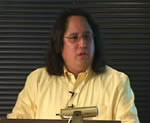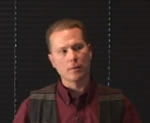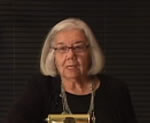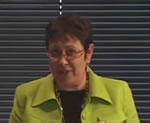Indigeneity as a Category of Critical Analysis
2007-08 American Indian Studies Speaker Series
As a category of critical analysis, "indigeneity" marks an intellectual arena located at the crossroads of where the processes of colonization intersect with communities who define themselves in terms of kinship networks, first languages, sacred histories, and ceremonial cycles tied intimately to the landscapes surrounding them. Indigeneity marks a community-grounded intellectual project that challenges and disrupts common constructs such as race, ethnicity, and nation. Those, more familiar terms, pose ontological and epistemological problems for and in indigenous studies; too often they erase indigenous perspectives completely.
In the contemporary world, where imposed displacements and diasporas, volatile borders, and coerced exiles confuse and obliterate human perspectives, "indigeneity" holds the promise of illuminating and reframing questions of place, space, movement, and belonging. Thus, this reading group provides occasion to address several questions. For instance, how does "indigenous" signify and challenge the historical and material conditions of colonization, industrialism, and globalization? In what ways does indigeneity permit the remapping of state sovereignty, or the hegemony of multinational institutions? How does indigeneity function as a political, geographical, or theoretical category and how does bringing indigeneity to the fore in fields such as anthropology, communications studies, literary studies, gender and women's studies, history, landscape architecture, law, philosophy, political science, psychology, racialized communities studies, and sociology allow for new intellectual relationships in the humanities?
Finally, what are the responsibilities of university-based American Indian Studies scholars to engage legacies of imperialism in which our lands, resources, and intellectual traditions have been appropriated and redeployed as the foundation for state power? Engaging critically with indigeneity as a site of intellectual inquiry allows scholars interested in social justice to radically address discourses that underpin colonial institutions.
Speakers for the Series include:
- Joseph P. Gone − September 20, Levis Faculty Center
- Jeff Corntassel − October 10, Levis Faculty Center
- Elizabeth Cook-Lynn − November 6, Levis Faculty Center
- Noenoe K. Silva − February 14, Levis Faculty Center
- Makere Stewart-Harawira − March 6, Alice Campbell Alumni Center
- Aileen Moreton-Robinson − April 22, Levis Faculty Center
Support for this series is provided by:
Center for Advanced Study, Department of Anthropology, African American Studies and Research Program, Asian American Studies Program, Center on Democracy in a Multiracial Society, Office of the Chancellor, Unit for Criticism and Interpretive Theory, Department of English, Gender and Women's Studies, Department of History, Illinois Program for Research in the Humanities, Institute for Communications Research, Latina/Latino Studies Program, College of Law, College of Liberal Arts & Sciences, Department of Political Science, Office of the Provost, Department of Psychology (Clinical/Community Division), Department of Sociology, and the Student Cultural Programming Fees
The Indigeneity Series culminated with a conference, Decolonizations: Subaltern Studies and Indigenous Critical Theory Conference.
Clicking on a picture will launch a video of the selected the speaker
Joseph P. Gone
Psychology (Clinical Area) and American Culture (Native American Studies), University of Michigan
Keeping Culture in Mind: Therapeutic Integration in a First Nation Treatment Center
Jeff Corntassel
Indigenous Governance Programs, University of Victoria, British Columbia
Persistence of Peoplehood: Regenerating Indigeneity during the Forced Federalism Era
Elizabeth Cook-Lynn
Native American Studies and English, Eastern Washington University
Indian Studies and Postcoloniality: An Analysis
Noenoe K. Silva
Indigenous Governance, University of Hawai'i at Manoa
The World and Everything On It: The Creation of a Native Universe by 19th C. Kanaka Writer Joseph Kanepuu
Makere Stewart-Harawira
Department of Educational Policy Studies, University of Alberta
Bifurcations, Equivocations and Invocations: Redefining Indigenous Citizenship in the Dying Days of Empire
Aileen Moreton-Robinson
Indigenous Studies, Queensland University of Technology
White Possession: The Legacy of Cook's Choice





